In every person’s life, there comes a time when the need for change becomes evident. For Viktoriia Sviatchenko, a Ukrainian language and literature teacher, these changes became a turning point. Having a large family and successfully receiving her PhD in the sphere of education, in 2018 she decided to embark on a new venture — to become the founder of a company that would provide high-quality broadband internet access in the rural areas of Donetsk and Kharkiv regions. For Viktoriia, the internet was not just a technology, but a tool for giving people access to endless opportunities for learning, development, work, and leisure.
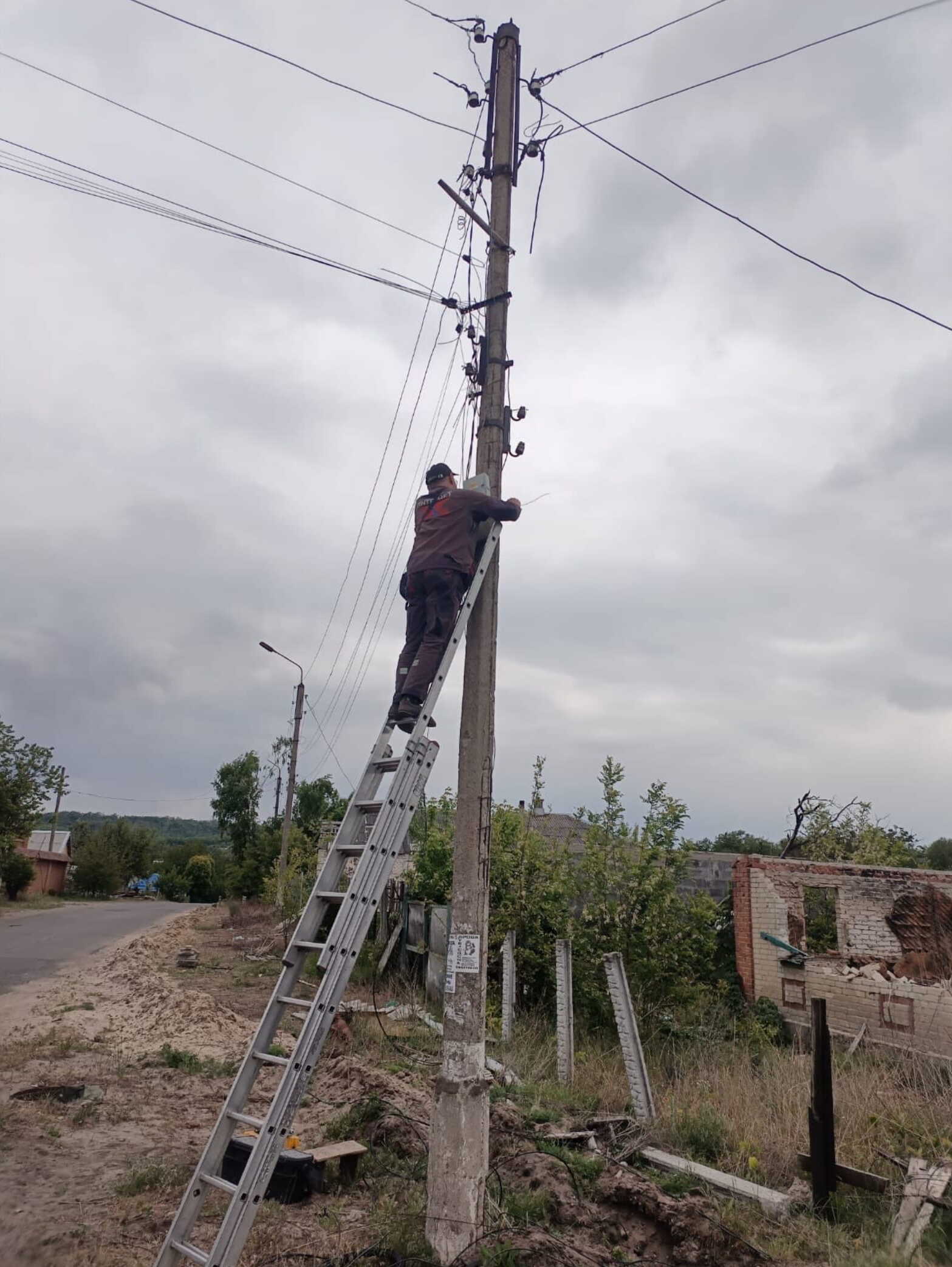
With the start of the full-scale invasion of Russia into Ukraine in 2022, Viktoriia’s company lost most of its clients, and a significant part of the equipment and internet lines were destroyed. The existence of the business, which had been growing since 2018, was under threat. Despite this, Viktoriia and her team did not stop; instead, they focused on restoring and continuing operations.
Thanks to grant support under the ReACT4UA program, financed by the German Government and implemented by the German federal company “Deutsche Gesellschaft für Internationale Zusammenarbeit (GIZ) GmbH, two employees of the company underwent training in 2024 on the installation and maintenance of PON fiber-optic networks. This allowed them to repair damaged networks more quickly and improve service quality. With the grant funds, the company purchased the necessary equipment and materials to restore connectivity in the liberated territories, particularly in the Sviatohirsk community.
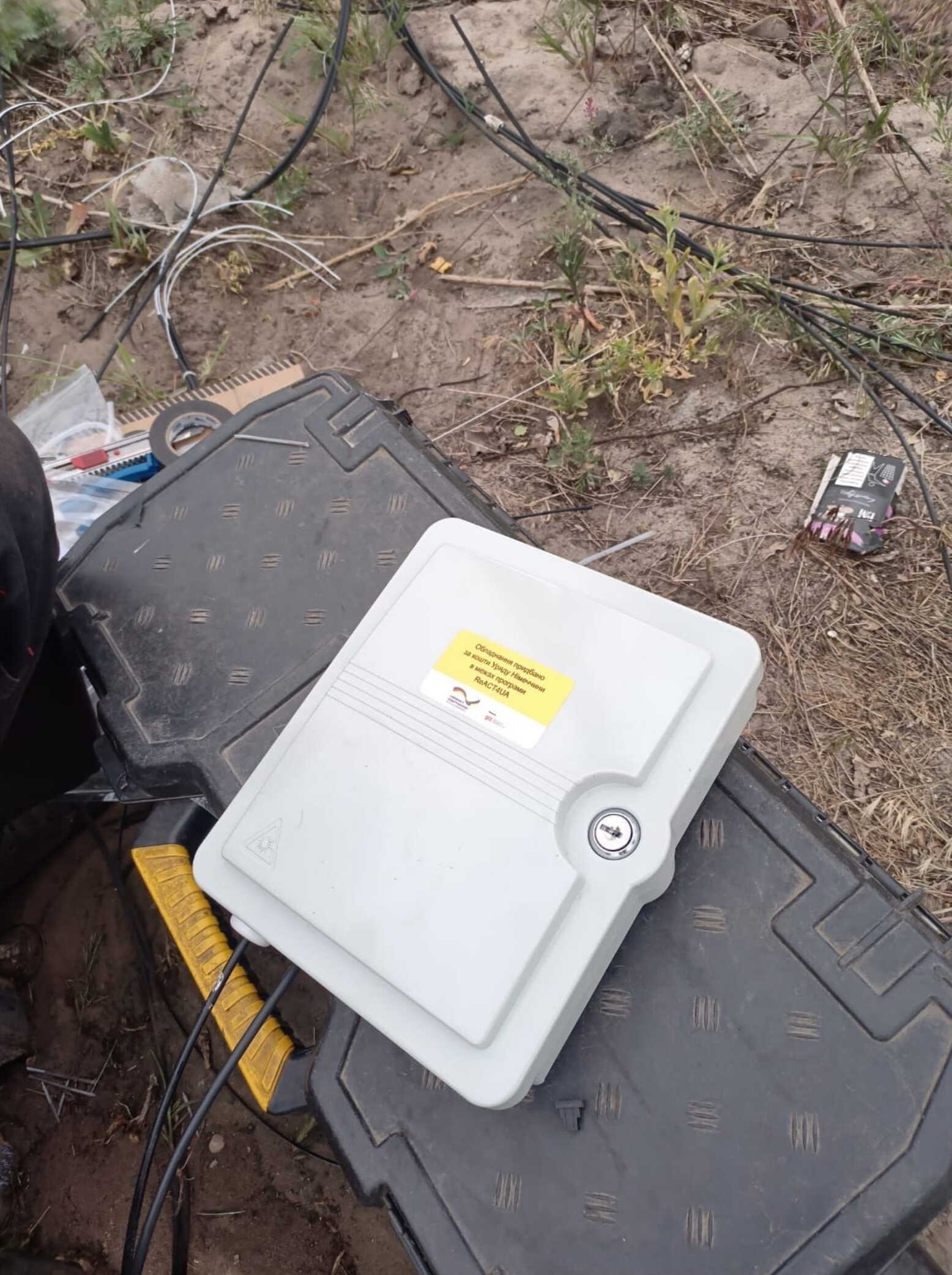
The project “Restoration of xPON Technologies in the Liberated Territories of the Sviatohirsk Community”, supported by the ReACT4UA program, enabled the laying of important internet lines in the village of Yarova and the city of Sviatohirsk. The company restored internet services for 190 subscribers, and this number continues to grow.
Thanks to the implementation of new technologies such as xPON, the business can continue providing high-quality services despite the difficult wartime conditions with ongoing shelling of the liberated and frontline areas.

“In the conditions of war and blackouts, our company strives to provide uninterrupted internet connectivity even in the absence of electricity. For our company, this has posed new challenges that require investments in network modernization, protection from cyberattacks, and recovery in case of damage from shelling. Thanks to the support of the ReACT4UA program, we have not only been able to restore broadband internet services but also strengthen the business, expand its capabilities, and plan for future growth,” notes Viktoriia Sviatchenko.
Reference information
Non-reversible financial support (grants) to Ukrainian telecommunication operators in de-occupied territories is provided within the international cooperation project ReACT4UA (“Utilization and Implementation of the Association Agreement between the EU and Ukraine in the field of trade”), financed by the German Government and implemented by the German federal company “Deutsche Gesellschaft für Internationale Zusammenarbeit (GIZ) GmbH”. The grants were made possible by ad-hoc funding from the German Government. The programme aims to support Ukraine’s economic resilience, recovery and growth, create better conditions for the development of Ukrainian small and medium-sized enterprises (SMEs) as well as support innovation and exports.
The strategic implementer of the programme is the German federal company “Deutsche Gesellschaft für Internationale Zusammenarbeit (GIZ) GmbH”. The implementing partner is Better Regulation Delivery Office (BRDO). The support is given by: The Ministry of Digital Transformation of Ukraine.
The contents are the sole responsibility of BRDO and do not necessary reflect the views of the European Union and the German Government.
#eu4business, #MovingForwardTogether, #gizSME
The LCC “Danet” is an internet provider that has been operating in Derhachi since 2015. The company has its own fibre-optic networks in all districts of the city and provides subscribers on almost every street. The company’s philosophy is to perceive its business, employees and customers as one big family that can only grow through unconditional love and care.
From the first days of the full-scale Russian invasion, the Derhachi community suffered from the horrors of war due to its proximity to the border with Russia (less than 2 km). About 45% of the community’s territory was under occupation. The city of Derhachi was not occupied, but the Russian army shelled it daily with artillery, rockets and bombs, including the use of prohibited weapons. The community’s territory had the status of a “grey zone”, where the fiercest fighting continued, and the town suffered significant damage.
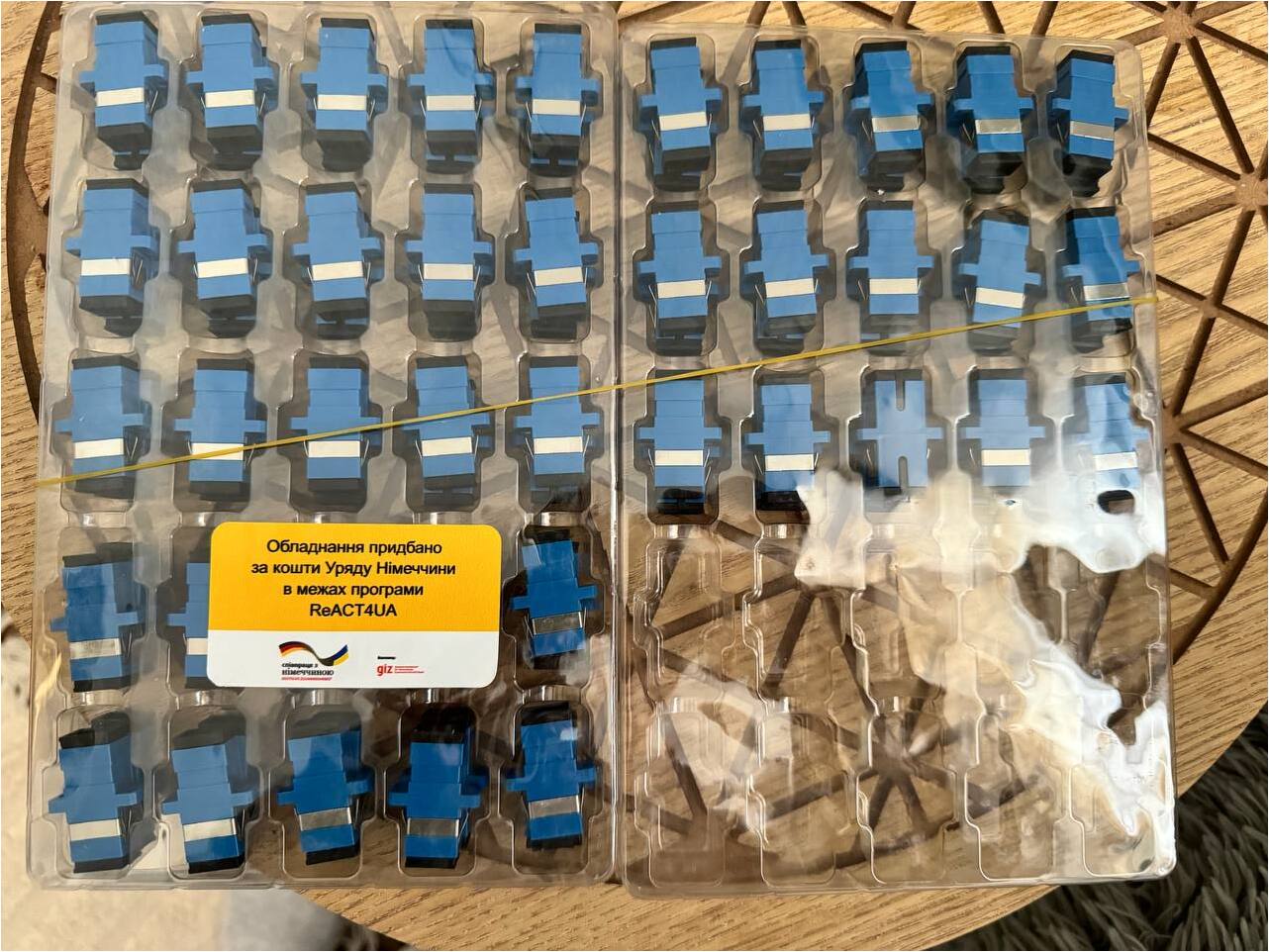
Due to the daily shelling, the network of LLC “Danet” was severely damaged and required partial or complete restoration in different parts of the city. A rocket hit the building of the Derhachi House of Culture and completely destroyed LLC “Danet” servers and switching equipment.
By participating in and winning a grant competition under the ReACT4UA programme funded by the German government and implemented by the German federal company “Deutsche Gesellschaft für Internationale Zusammenarbeit (GIZ), the LCC “Danet” was able to purchase the necessary materials to repair and replace the fibre-optic network, restore subscriber connections and ensure the network’s autonomous operation during blackouts.

“The grants that the LCC “Danet” received under the ReACT4UA programme allowed us to purchase the necessary equipment to restore and repair damaged networks. Such support and grant projects are very important, as the business of Ukrainian providers in the frontline, de-occupied and border areas has found itself in difficult conditions. 90% of subscribers were forced to leave the city at the beginning of the full-scale invasion, the networks are constantly damaged by Russian attacks, and there are great risks for repair and restoration teams. However, we continue to operate, provide communication services to civilians and the military, and are able to work,” says Natalya Fisun, Director of the LLC “Danet”.
Today, the population of the community has grown again to almost 20,000 people, of whom 16,000 live in Derhachi, which is 90% of the pre-war population. Not only local residents have returned to Derhachi, but also people from the destroyed settlements in the north have moved there. This has significantly increased the demand for internet connection, and the LCC “Danet” has managed to increase the number of subscribers by 15% and improve the quality of its services thanks to its participation in the programme.
Reference information
Non-reversible financial support (grants) to Ukrainian telecommunication operators in de-occupied territories is provided within the international cooperation project ReACT4UA (“Utilization and Implementation of the Association Agreement between the EU and Ukraine in the field of trade”), financed by the German Government and implemented by the German federal company “Deutsche Gesellschaft für Internationale Zusammenarbeit (GIZ) GmbH”. The grants were made possible by ad-hoc funding from the German Government. The programme aims to support Ukraine’s economic resilience, recovery and growth, create better conditions for the development of Ukrainian small and medium-sized enterprises (SMEs) as well as support innovation and exports.
The strategic implementer of the programme is the German federal company “Deutsche Gesellschaft für Internationale Zusammenarbeit (GIZ) GmbH”. The implementing partner is Better Regulation Delivery Office (BRDO). The support is given by: The Ministry of Digital Transformation of Ukraine.
The contents are the sole responsibility of BRDO and do not necessary reflect the views of the European Union and the German Government.
#eu4business, #MovingForwardTogether, #gizSME
For the second year in a row, the IT and Telecom sector team at the Better Regulation Delivery Office (BRDO) has been analyzing the financial reports of the 30 largest IT companies by revenue. The combined revenue of these companies accounts for 42% of the total IT market revenue. In 2023, the Top 30 companies generated $2.5 billion in revenue and paid $53 million in corporate tax to the state budget. The ranking leaders are EPAM Systems, GlobalLogic, Luxoft among service companies, and Fintech Band (monobank) among product companies.
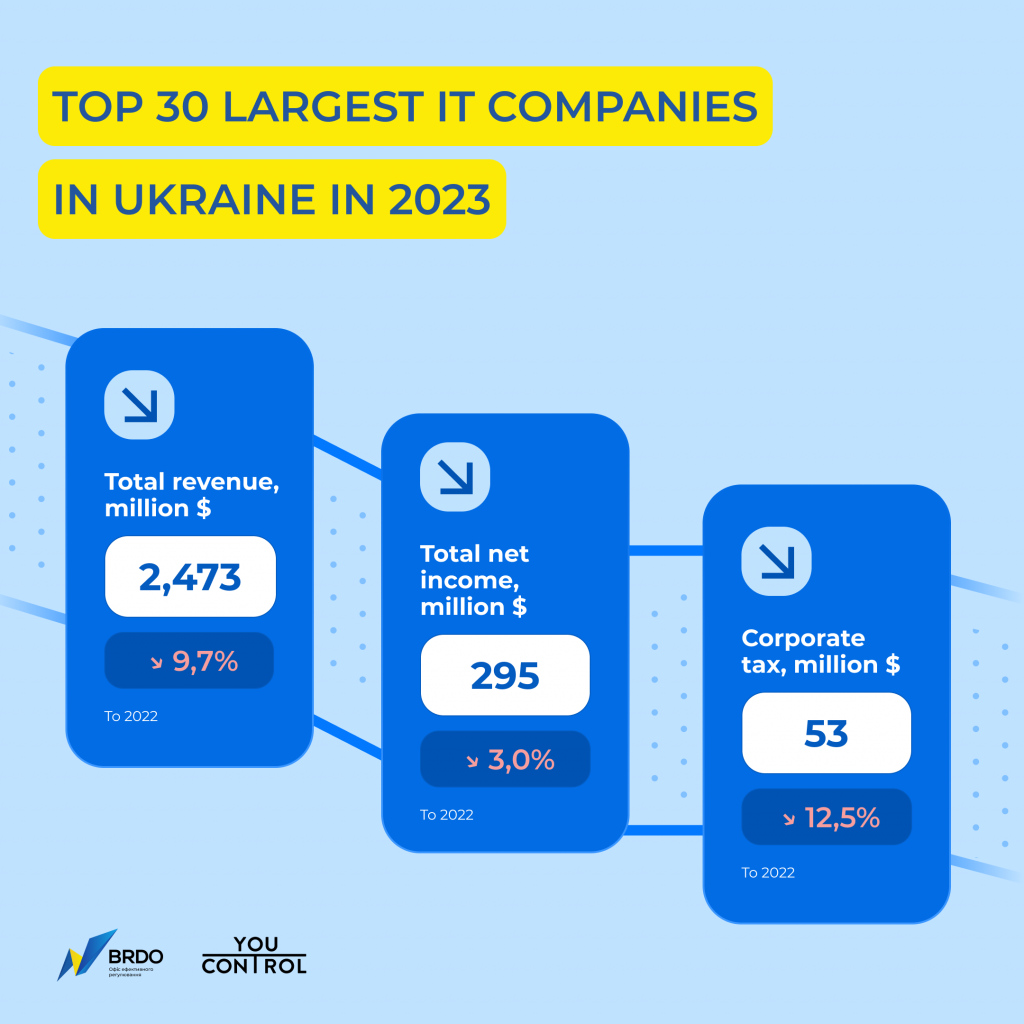
According to the State Statistics Service, the total revenue of the Top 30 IT companies decreased by 6% ($145 million) in 2023. This was due to reduced demand for IT services, opening of new offices abroad, the subsequent outflow of specialists, and the redistribution of business activities among multiple legal entities. The top five service companies by revenue are EPAM Systems, GlobalLogic, EPAM Digital, Luxoft, and Intellias, while the leading product companies are Fintech Band, Playtika, Playtech, Prom, and UPC.

Ihor Samokhodskyi, Head of the IT and Telecom sector at BRDO, noted: “Access to the financial reports of IT companies enables us to analyze the industry’s business activity, track trends, and observe changes in revenue of key players over the years. Ukrainian IT continues to operate in the face of war. We see that despite the overall decrease in revenue, some players are showing growth regardless of the challenges.”
Roman Kornilyuk, Financial analyst at YouControl, added: “During wartime shocks and systemic instability, it is important to monitor sectoral financial indicators. Ukraine’s IT market, influenced by militarization, digitalization, and Euro-integration, is undergoing rapid changes that require careful analysis to make informed decisions. The YouControl team provides society with the tools based on open data analytics to better understand sectoral issues and identify new opportunities for IT business development.”
Fintech Band, EPAM Systems, and GlobalLogic show the highest net income, generating 47% of the Top 30’s total amount.
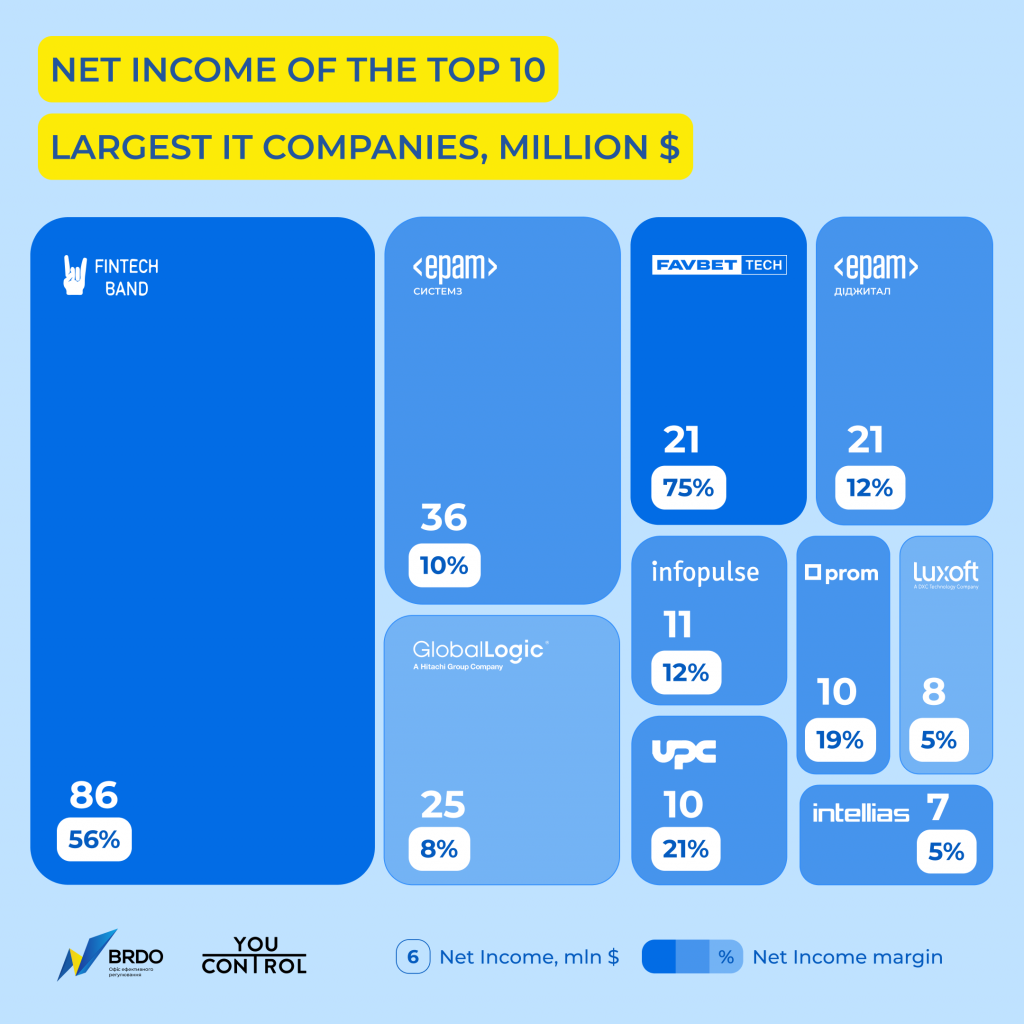
In 2023, IT companies in the ranking paid $53 million in corporate tax, 12.5% less than in 2022. Fintech Band and EPAM Systems contributed half of the total corporate tax the Top 30 companies paid. Five of the Top 30 companies became payers of the exit capital tax, one of the benefits of Diia.City, which allowed them to reduce their tax burden. The largest exit capital taxpayer was GlobalLogic, paying $350,000 in 2023, compared to $9 million in corporate tax in 2022.
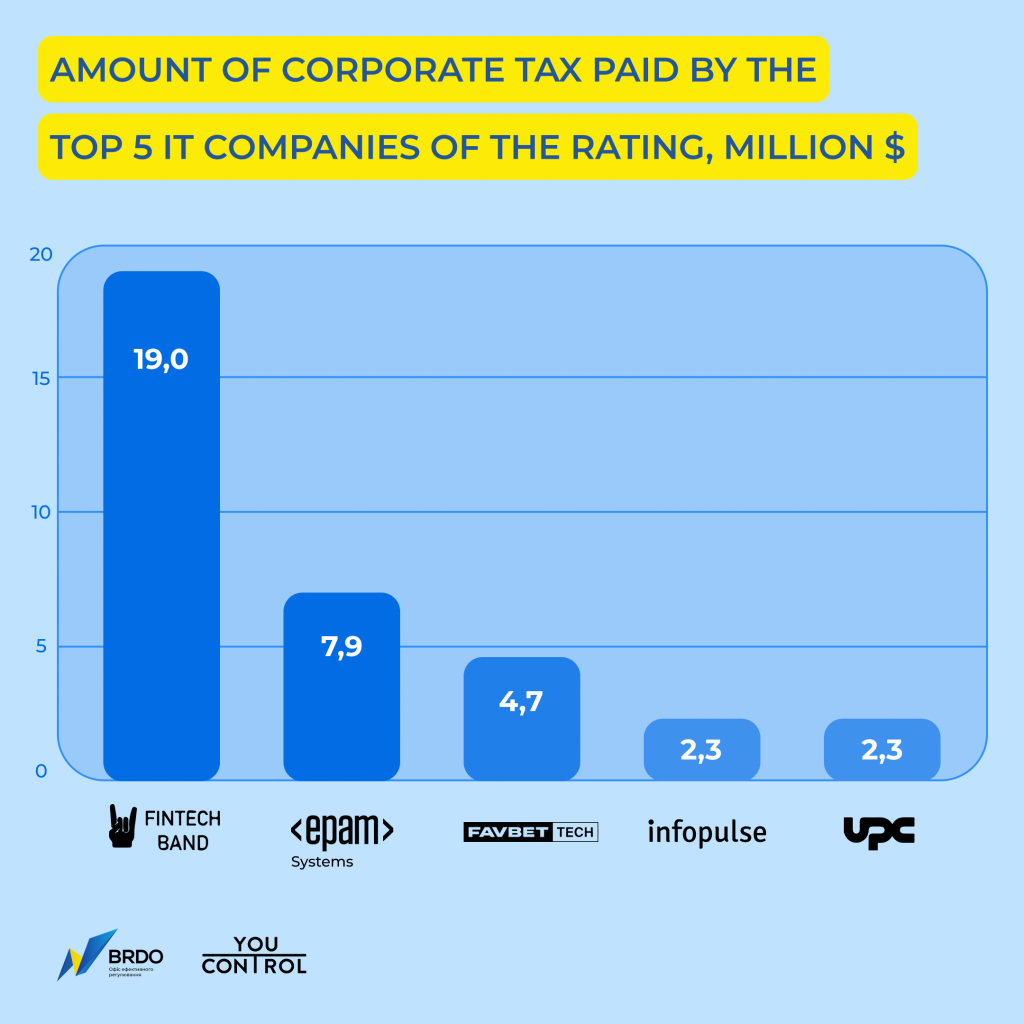
The Ukrainian IT market continues using the individual entrepreneur model to collaborate with specialists. However, in 2023, full-time employment in the Top 30 companies increased by 24%, reaching 10,500 employees. Some companies created additional legal entities to take advantage of all the benefits of Diia.City residency, particularly regarding taxation of full-time employees. For example, last year EPAM Digital increased its staff by 2,500 people, and SoftServe Technologies by 1,200 people. Regarding revenue per IT specialist, the absolute leader is video game developer Playtika, with $6,900 per month.
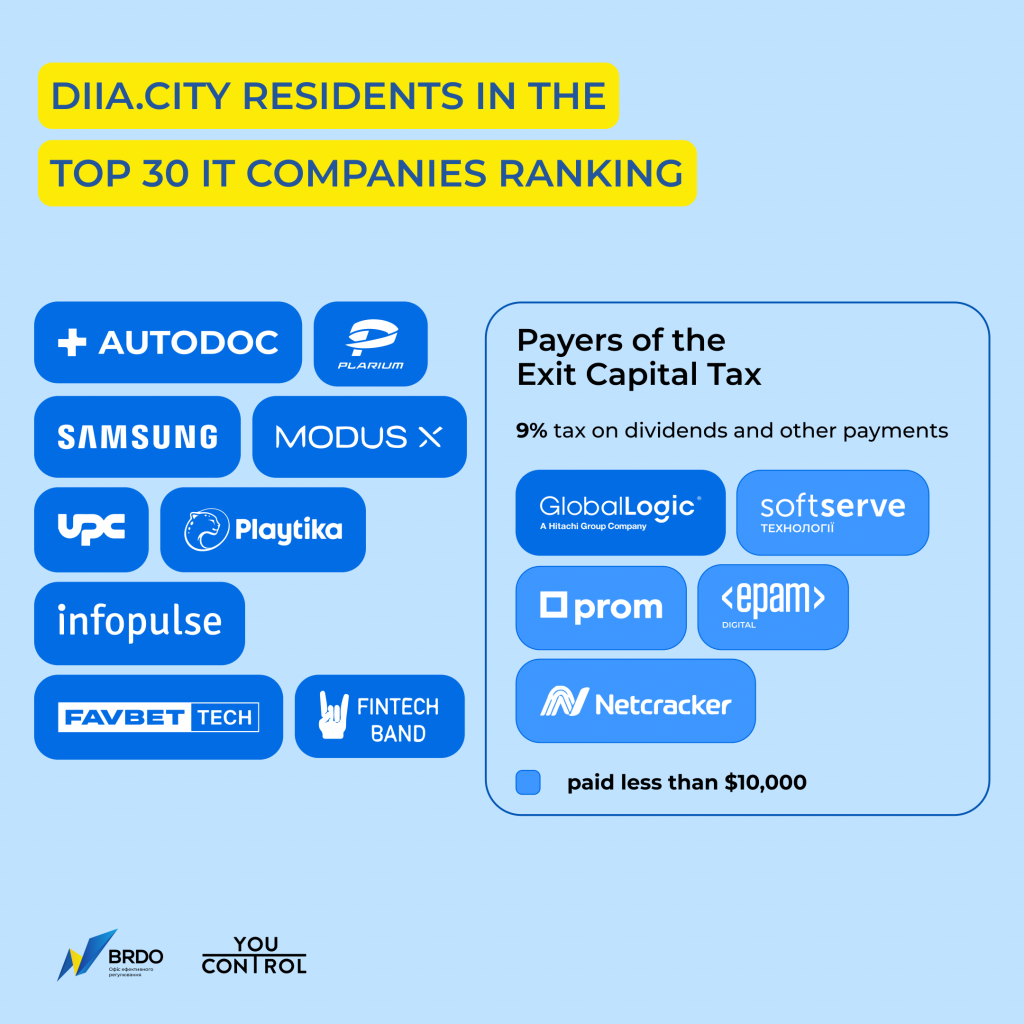
New companies that entered the Top 30 largest companies in 2023 include Modus X, the SCM Group company, system integrator Seeton Group, Favbet Tech, and several companies from the SoftServe Group. Meanwhile, Metinvest Digital (SCM Group), the Ukrainian division of Snap Inc., Visa, the service company Star, and video game developers Wargaming and Ubisoft left the Top 30.
The financial reports of the legal entities of IT companies were published by the State Statistics Service of Ukraine and provided for analysis by YouControl, an online system for business analytics, competitive intelligence, and due diligence.
It has long been the dream of Svitlana Myrna, the founder and CEO of LLC “BRAIN STREAM”, to connect every home in her small village to the Internet. To implement this goal, she created her own company, a small enterprise of 6 specialists registered in Borzna, Nizhyn district, Chernihiv region. However, the company provides internet connection services in the adjacent rural areas of Borzna, Plyskivka and Krutiv ATCs – in those remote corners where other operators often do not come.

Svitlana Myrna’s idea was not just to connect rural residents to the Internet, but with the help of modern communications to open unprecedented opportunities for them – both access to information and modern digital services that have been actively implemented in Ukraine in recent years. So, even before the full-scale invasion of the Russian Federation, the company took part in the project to connect critical social infrastructure facilities in the adjacent rural areas to broadband Internet access and began to do so in an innovative, but also not cheap way – by laying a cable underground.
In the first months of the Russian Federation’s full-scale invasion, the company’s networks were destroyed and damaged. Communication nodes and visible cables were destroyed by the enemy army. Since the main trunk cables of LLC “BRAIN STREAM” were laid underground in inter-village fields, the company’s subscribers in Chernihiv region had access to the Internet during the most difficult months of February and March.
However, other cable networks that had been laid by air continued to be damaged, spare cables and other equipment for emergency repairs and connection of subscribers were in short supply, and personnel capable of repairing the damage quickly and efficiently were mobilised. Energy challenges were also added to the mix: as a result of Russia’s targeted shelling of Ukrainian energy facilities and widespread power outages, the need for autonomous power sources arose.
Coping with all the challenges alone was not easy. That is why participation and winning in the grant call within the international cooperation project ReACT4UA, financed by the German Government and implemented by the German federal company “Deutsche Gesellschaft für Internationale Zusammenarbeit” (GIZ), became a lifeline for the continuation of the work of LLC “BRAIN STREAM”.
Thanks to the grant funds, LLC “Brain Stream” purchased an optical fibre welding machine, which is the most necessary working tool which is used daily during scheduled and emergency visits and when new subscribers are connected. The team also uses it to demonstrate professional skills in specialised educational institutions and to conduct industrial and theoretical practice for students at the company. New connecting elements, such as crossover boxes and ground couplings, which are mounted underground to protect them from shelling, are now used instead of improvised structures.
Within the implementation of the grant project, a fibre-optic cable has been laid at Khoroshe Ozero railway station. It connected the villages of Khoroshe Ozero, Ombysh and Pechi to the network. In Khoroshe Ozero, 42 households have already been connected. The villages of Ombysh and Pechi are in the process of being connected – their social infrastructure facilities and the Points of Invincibility have already been provided with internet connection.

Also, thanks to participation in the ReACT4UA programme, the team was trained at the DEPS Engineering and Service Centre, where they learned how to choose technologies and software with maximum access to developer support. According to CEO LLC “Brain Stream” of Svitlana Myrna, the company can now quickly receive updates, support and solutions to any of their technical issues.
The company’s grant project under the ReACT4UA programme also included the development of SMART goals, strategic plans for building the region’s infrastructure and improving its economic performance – because without high-quality infrastructure for access to Internet communications, neither the education of the younger generation, nor the scaling of local businesses, nor the development of the community is possible.
“Small villages are being killed by the lack of modern technology and communication – there is a threat of whole settlements turning into fields. I put my heart and soul into my idea while writing the grant project, because the development of a strong economy begins with training and support for the local population, which will become the foundation for training a new generation that will have access to modern educational practices thanks to a high-speed and stable Internet connection. That is why programmes such as ReACT4UA are important, because they not only accelerate progress, but also impact communities by providing them with access to information, resources and opportunities,” says Svitlana Myrna.
Reference information
Non-reversible financial support (grants) to Ukrainian telecommunication operators in de-occupied territories is provided within the international cooperation project ReACT4UA (“Utilization and Implementation of the Association Agreement between the EU and Ukraine in the field of trade”), financed by the German Government and implemented by the German federal company “Deutsche Gesellschaft für Internationale Zusammenarbeit (GIZ) GmbH”. The grants were made possible by ad-hoc funding from the German Government. The programme aims to support Ukraine’s economic resilience, recovery and growth, create better conditions for the development of Ukrainian small and medium-sized enterprises (SMEs) as well as support innovation and exports.
The strategic implementer of the programme is the German federal company “Deutsche Gesellschaft für Internationale Zusammenarbeit (GIZ) GmbH”. The implementing partner is Better Regulation Delivery Office (BRDO). The support is given by: The Ministry of Digital Transformation of Ukraine.
The contents are the sole responsibility of BRDO and do not necessary reflect the views of the European Union and the German Government.
#eu4business, #MovingForwardTogether, #gizSME
On 8 October, the Parliament of Ukraine supported in the first reading the draft law No. 5837 “On the basic principles of state supervision (control)”.
The document, developed by the Ministry of Economy jointly with the State Regulatory Service and BRDO experts, is aimed at creating a favourable business environment and developing small and medium-sized enterprises. The adoption of these amendments was recommended at a meeting of The Interagency Working Group on the Accelerated Review of Instruments of State Regulation (IWG).
What is changing for business?
The draft law also strengthens the protection of citizens’ rights and encourages business to be held accountable by eliminating unfair schemes for evading legitimate inspections.
Why is this important?
This draft law is part of a large-scale deregulation that is part of one of the four strategic goals of the SME Strategy adopted by the Government – to restore and facilitate business.
The deregulatory approach of the Strategy is in line with the EU’s goal of simplifying the regulatory environment and will help small and medium-sized businesses grow. The priority is to take into account the needs of SMEs according to the “Think small first” principle.
The adoption of this draft law is also a fulfilment of one of the points of the Ukraine Plan.
Ukraine Facility is a program of financial support for Ukraine from the EU in the amount of 50 billion euros, which will be directed to the Ukrainian economy during 2024-2027. Funds from European partners will not be able to fully cover the country’s budget deficit, but they will definitely make a significant contribution to the stability of our economy.
The plan for the Ukraine Facility is a technical document necessary for the launch of the program. The implementation of the Plan will contribute to the European integration of Ukraine and the further sustainable development of the economy.
As a reminder, the IWG on Deregulation has already reviewed more than 1,300 regulatory instruments, a significant part of which was recommended for cancellation or simplification.
Better Regulation Delivery Office (BRDO) joined the work of the IWG within the EU4Business: SME Policies and Institutions Support (SMEPIS) project, implemented by Ecorys in a consortium with GIZ, BRDO and Civitta with the financial support of the European Union. The content of this publication is the sole responsibility of SMEPIS and does not necessarily reflect the opinion of the European Union.
BRDO, jointly with civil society organizations and industry associations, calls to preserve the simplified taxation system for internet providers – SMEs in Ukraine. A letter with this call was addressed to the President, Parliament, Government, and the National Security and Defense Council (NSDC) of Ukraine.
What happened?
In May 2024, the State Tax Service of Ukraine (STS) published a clarification on its website stating that the simplified taxation system cannot be applied to internet service providers that are legal entities. According to it, starting from October 1, 2024, the STS banned small business internet providers from using the simplified tax model. The STS justifies its actions by citing the entry into force of the “Law on Electronic Communications” on January 1, 2022, mistakenly interpreting internet access services as services for maintaining and operating electronic communication networks. However, this interpretation directly contradicts the provisions of the Tax Code, Articles 19 and 57 of the Constitution of Ukraine, and the official clarification of the electronic communications regulator (NCEC).
How will this impact Ukraine’s electronic communications sector?Internet access has become an essential part of modern life, and in times of war, it serves as a vital tool for receiving timely information about threats and ensuring survival. Ukraine’s fixed broadband internet market is highly competitive, with more than 4,000 internet providers authorized by the national regulator (NCEC), many of which are small businesses that use the simplified taxation system. According to the regulator’s 2023 data, the availability of fixed broadband networks, particularly in rural areas, increased by 25%, and the number of connections to passive optical networks (PON), which consume less electricity, grew by over 41%.
The position of the State Tax Service could lead to higher costs and reduced internet accessibility for Ukrainians.
Due to the challenges in tax administration and the rising expenses for accounting and reporting under the general tax system, many small internet providers may cease operations. This is especially critical in rural areas, front-line regions, and recently de-occupied territories, where large providers typically show little interest due to low profitability, leaving small businesses as the main providers of services.
What could be the consequences of this decision?
BRDO calls for:
Signatories of the Appeal:
We invite you to support our position and spread information about it.
Draft Law No. 12066 on amendments to the Law of Ukraine “On Military Duty and Military Service” regarding the creation and functioning of the Unified State Register of Servicemen was registered in the Parliament. This document is aimed at improving the procedure for maintaining military records and protecting personal data of servicemen.
The draft law was developed with the participation of experts of the Better Regulation Delivery Office.
What changes are expected?
As the registry may become a target of cyberattacks by the Russian Federation, the best international cybersecurity practices will be applied to ensure the reliability of the data.
The implementation of the draft law will not require additional costs from the state budget.
The adoption of the draft law will be an important step towards the digitalisation of the national security sector and will greatly simplify the processes of managing military records and data. Therefore, we are looking forward to the adoption of this draft law as soon as possible!
This is an important step to support national production and strengthen defence capabilities.
Tenders include two lots:
“The Coalition’s goal is to secure the industrial-scale manufacturing of FPV drones to gain a technological advantage over the enemy in the long run. Boosting production in Western countries and aiding Ukrainian companies with the capacity to manufacture such equipment are both crucial. That is why we are now welcoming domestic manufacturers to engage in tenders,” said Kateryna Chernohorenko, Deputy Minister of Defence for Digital Development.
Why is this important?
What does the BRDO have to do with it?
The BRDO team developed a model for engaging Ukrainian companies and facilitated its coordination with the member countries of the Drone Coalition. This project was made possible thanks to the leadership of the Minister of Defence of Ukraine Rustem Umerov and Deputy Minister of Defence for Digitalisation Development Kateryna Chernohorenko.
Register and apply on the website of the UK Ministry of Defence.
On 18 September, the Unified State Electronic System of Permit Documents (ePermit) https://e-license.gov.ua/ was officially launched, allowing entrepreneurs to obtain licences and other permits in electronic form. The system was presented during the event “Economic Policy of Ukraine: Recovery During the War” held by the Ministry of Economy of Ukraine in Kyiv on 16 September 2024. The ePermit project is funded by the European Union under the EU4DigitalUA project, implemented by FIIAPP.
The first service is already available in the system – registration of the declaration of compliance of the material and technical base with the requirements of labour protection legislation https://diia.gov.ua/services/e-pidpriyemec. It is part of the comprehensive e-Entrepreneur service available on the Diia portal, which was developed and continues to be scaled up with EU financial support under the EU4DigitalUA and DT4UA projects. Within the framework of these projects, the E-Governance Academy supported the development of this service, as well as its promotion together with FIIAPP.
The team of the Better Regulation Delivery Office was also involved in the implementation of this service. Due to the work of the ePermit system, the process of filing declarations will be automated. The system will monitor the completeness of the information: it will indicate if any of the fields are not filled in, or it will automatically accept the declaration if all fields are filled in correctly.
Why is this important
The ePermit system was created to convert the procedures for issuing permits for business into electronic form.
As part of the first stage of ePermit, the Ministry of Economy plans to digitise the receipt of the most popular business services, including licences for veterinary practice, preschool education, and business activities in the field of circulation of narcotic drugs, psychotropic substances and precursors.
And already in October, the ePermit will allow to obtain a Conclusion on the extension of the deadlines for settlements for export and import operations.
The ePermit project is implemented by the Ministry of Economy of Ukraine in partnership with the Ministry of Digital Transformation of Ukraine funded by the European Union under the EU4DigitalUA project, implemented by FIIAPP.
The project is also supported by DT4UA, which implements the E-Governance Academy. Advisory support for the development of regulations for the system is provided by the EU4Business: SME Policies and Institutions Support (SMEPIS) project implemented by Ecorys in a consortium with GIZ, BRDO and Civitta with the financial support of the European Union. TThe Digital Transformation Activity, funded by USAID and UK Dev, provides a full cycle of ePermit project implementation. The implementation partner is the Better Regulation Delivery Office (BRDO). The main government beneficiary of the ePermit system is the Ministry of Economy of Ukraine.
The Ministry of Economy of Ukraine highlighted the key areas of work and strategies to overcome the challenges caused by Russia’s full-scale invasion during the event “Economic Policy of Ukraine: Recovery During the War” held on September 16, 2024.

“One of the government’s primary tasks is to maintain GDP growth and achieve economic self-sufficiency. We are moving towards our strategic goals: attracting investments into the real sector, increasing non-commodity exports, transforming the economy by raising the share of processing in GDP, and improving the labor market. For each of these priorities, we have a clear set of tools to achieve these objectives,” said Yuliia Svyrydenko, First Deputy Prime Minister and Minister of Economy of Ukraine, during the presentation.
According to her, the Ministry’s current priorities include the digitalization of public services to facilitate business operations.
“This week, we are launching the digitization of public services through the ePermit service. Starting from September 18, the first digital service will be available to entrepreneurs, with more services to follow. For instance, starting in October, ePermit will allow businesses to obtain approvals for extending settlement deadlines for export and import transactions, something they have long been asking for,” noted Yuliia Svyrydenko.
First Deputy Minister of Economy, Oleksii Sobolev, during the event presented the SME Recovery Strategy for 2027. The government-approved document outlines the main directions of state policy in the SME sector, including rebuilding destroyed enterprises following the “build back better” principle. Special attention is given to the green transition, digital transformation, innovative development, and business inclusivity, engaging women, people with disabilities, internally displaced persons (IDPs), and veterans. The document incorporates OECD recommendations, aligns with the EU-Ukraine Association Agreement, and is synchronized with the Ukraine Facility Plan.
“Supporting SMEs is one of the Ministry of Economy’s and the state’s overall key priorities. The main task of the Strategy is to create conditions for SME development and provide partners with a clear understanding of where to invest, both now and after the war. The new strategy is inclusive and will foster business activity among women, people with disabilities, and veterans. It has been coordinated with businesses, the public sector, and experts, and has already been supported by our international partners. We already have a result — together with Germany, we launched the SME Resilience Alliance,” Oleksii Sobolev noted.
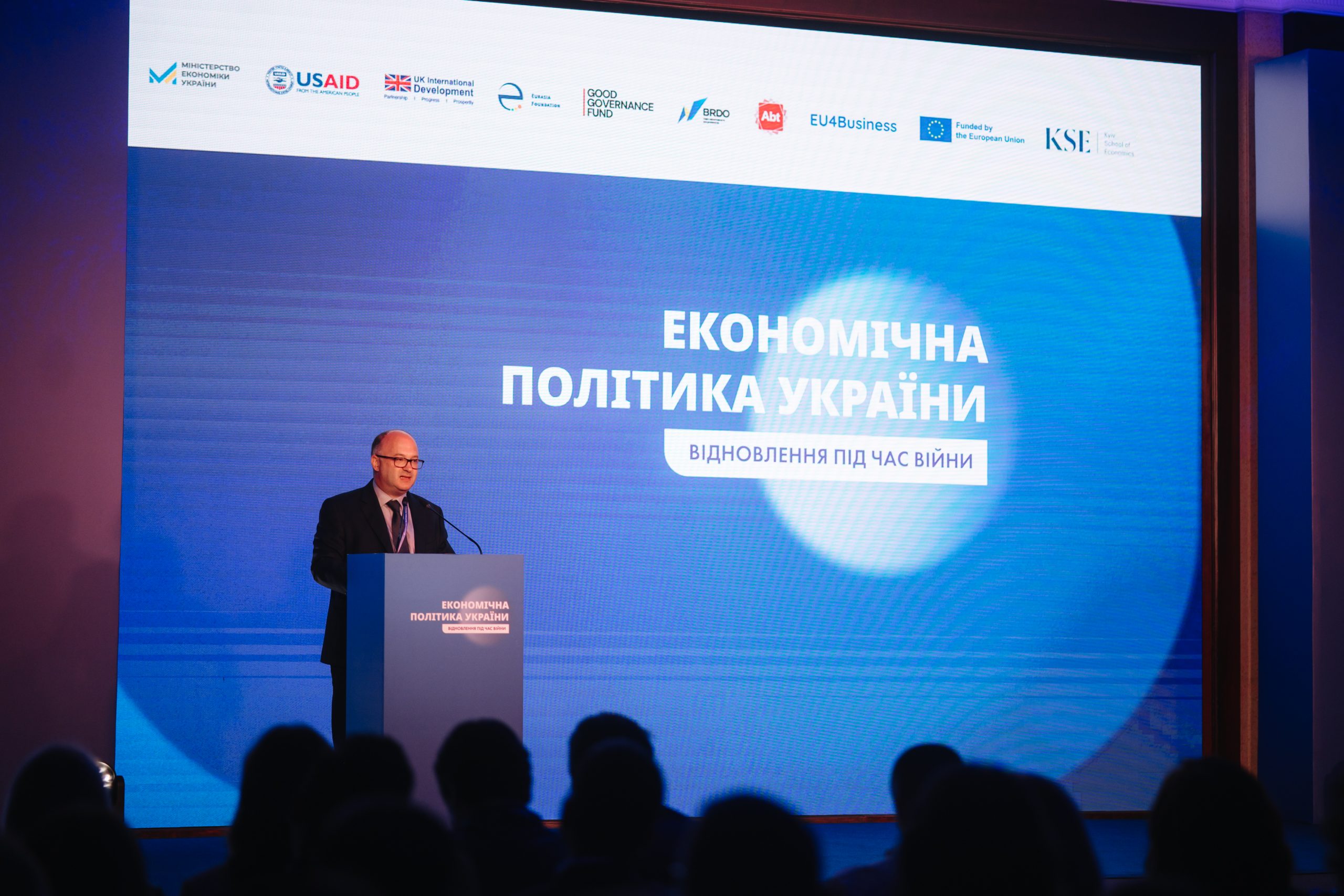
“SMEs have shown remarkable resilience in difficult times. Ukrainian businesses continue to work, enter new markets and look for investment opportunities. We are delighted to contribute to the development of the Strategy as it provides a cohesive and practical approach to business recovery. The UK is committed to supporting the Government of Ukraine in reshaping SME policies to be more responsive to business needs and encourage inclusivity and innovation. Practical support for inclusive policies is also important, so as part of the Good Governance Fund project, we are launching the Grow 2.0 educational programme for women who want to start or scale their business and learn new skills,” said Stefan Kossoff, Director of Development Programmes at the British Embassy in Ukraine.

“USAID has been supporting Ukraine’s small and medium enterprises for a long time. We do this through supporting the Government of Ukraine to enhance the business enabling environment, strengthening access to finance, providing joining investments to increase efficiency, and sending businesses on trade missions to find new markets. In total, USAID has supported more than 28,000 SMEs in key sectors across Ukraine. With our partners at UKAid, we are proud to support the launch of the digital Pulse and ePermit platforms that will help make business registration and feedback about GOU services simpler and more transparent, making it easier for thousands of SMEs to do business every year,” said Theodora Dell, Deputy Mission Director at USAID Ukraine.
Deputy Minister of Economy of Ukraine for Digital Development, Digital Transformations and Digitalization, Oleksandr Tsybort, presented digital platforms for business. In particular, the Pulse platform was created to enhance interaction between the state and businesses. Through it, any entrepreneur can provide feedback on the work of state bodies.
“The Ministry of Economy is not just a regulatory ministry; we provide services to businesses. Over half of the ministry’s civil servants are engaged in processing inquiries. At the center of any service must be the client, in our case, the entrepreneur, around whom the service is built. Our goal is to create a convenient and transparent process for business: a few clicks — and the service is delivered. The Pulse and ePermit projects are steps towards a digital state with transparent communications between businesses and the authorities. Pulse’s vision is not just an online platform for complaints and suggestions but a reliable data source for implementing reforms. The platform should amplify the voice of businesses and become a practical tool that allows entrepreneurs to actively influence decision-making by government bodies,” emphasized Oleksandr Tsybort.
Additionally, during his speech, the Deputy Minister presented the ePermit platform. This initiative aims to digitize key services for businesses.
According to Oleksandr Tsybort, the Ministry of Economy plans to digitize 10 of the most popular permits and licenses by the end of the year. These include, among others, permits and licenses for export, import, occupational safety declarations, and conformity certification of medicines. Moreover, to reduce regulatory pressure on businesses, the Ministry is currently working on implementing remote inspections and transitioning to a new service standard, focusing not on penalties but on preventing violations. This will help to reduce the number of inspections of small businesses and lower corruption risks.

Reference information:
The Pulse platform was developed thanks to the Digital Transformation Activity (DTA) with support from USAID and UK Dev. The implementation partner is the Better Regulation Delivery Office (BRDO). Its creation and development was made possible by the generous support of the American people through the United States Agency for International Development (USAID). The content is the sole responsibility of the Ministry of Economy of Ukraine and does not necessarily reflect the views of USAID or the United States Government. This platform was also developed with financial support from the UK Government’s International Development Program. However, the views expressed do not necessarily reflect the official policy of the UK Government.
The ePermit project is implemented by the Ministry of Economy of Ukraine in partnership with the Ministry of Digital Transformation and funded by the EU as part of the EU4DigitalUA project, implemented by FIIAPP. Consultation support for developing the legal framework is provided through the EU4Business: SME Policies and Institutions Support (SMEPIS) project, which is implemented by Ecorys in consortium with GIZ, BRDO, and Civitta, with financial backing from the European Union. Technical specifications for phase two were developed with the support of the EBRD. The Digital Transformation Activity, funded by USAID and UK Dev, provides a full cycle of ePermit project implementation. The implementation partner is the Better Regulation Delivery Office (BRDO). The main government beneficiary of the ePermit system is the Ministry of Economy of Ukraine.
The development of ePermit is part of the State Anti-Corruption Program 2023-2025 and is a component of the Ukraine Facility Plan.
The SME Recovery Strategy for 2027 was developed with expert support within the Good Governance Fund project “Business Revitalisation for Sustainable Growth” funded by UK International Development. The project delivery partners are Abt Global and Kyiv School of Economics.
The national project Diia.Business has presented an updated portal that will strengthen support for entrepreneurship in Ukraine and abroad. From now on, Diia.Business offers users a unique trajectory depending on the type of business and the stage of its development. Entrepreneurs can quickly and easily find all the information they need, from finding an idea for starting a business to entering foreign markets.
“We launched the Diia.Business project in 2020, with the mission to help create a country of entrepreneurs. It is already a powerful tool for business — 14 offline centres, a web portal with free consultations, a selection of grants, and a special focus on supporting Ukrainian exports. In 2024, we are relaunching the portal to provide everyone with even more opportunities and ideas for development. In the context of a full-scale war, entrepreneurs play a crucial role — we must create all the conditions for their success”, — said Mykhailo Fedorov, Vice Prime Minister for Innovations, Development of Education, Science and Technologies — Minister of Digital Transformation of Ukraine.
The updated portal also has a personal user account, where you can conveniently store the most relevant content on exports, grants, educational programmes, trainings and other development opportunities.
“At the Ministry of Digital Transformation, we are creating an ecosystem for entrepreneurs, where everyone has the opportunity to get the necessary information or advice. This is exactly the mission of the national project Diia.Business. In almost 5 years of its operation, 14 Diia.Business entrepreneurial support centres have been opened, and the project portal has been visited by more than 13 million users. To continue providing reliable support to Ukrainian businesses and stay one step ahead, we have rethought the Diia.Business platform. Now, the portal creates movement trajectories in accordance with the current requests of entrepreneurs and saves the most important resource –– time”, –– said Valeriya Ionan, Deputy Minister for Eurointegration and the Ministry of Digital Transformation of Ukraine.
The portal will also recommend events for entrepreneurs on a variety of topics: educational events, workshops, seminars, and international exhibitions. Users will be able to add them to their Google calendar in one click.
“Updating the portal is primarily a response to the needs of a modern Ukrainian entrepreneur. In the new version of the portal, we introduced a personalised approach to the available opportunities. From now on, the most relevant offers will be automatically prioritised in your personal account. This will allow entrepreneurs not to miss the most relevant opportunities for their business and to use the tools offered by Diia.Business as efficiently as possible”, — commented Аndrii Remizov, Director of the State Institution “Entrepreneurship and Export Promotion Office”.
The updated portal also has a chatbot that provides users with content on demand. Among other innovations, the Financial Opportunities Marketplace will allow users to compare financial programmes and sort them by priority.
“Diia.Business portal has become a valuable tool and an integral part of Diia ecosystem which continues to grow and expand. Through our EU4Business-SMEPIS project we were happy to support the transformation and upgrade of the Diia.Business functionality and hope it will be even more user-friendly and easy to navigate. The European Union is committed to support digital transformation in Ukraine, including a wide spectrum of Government-to-business services and instruments”, – said Henrik Huitfeldt, Head of Section for Public Finance, Business Support and Social Policies at the EU Delegation to Ukraine.
Ukrainian exporters will also get a number of updates, including a tool for searching for the UKTZED code when entering foreign markets. Foreign users can use filters to sort company profiles in the Catalogue of Ukrainian Exporters to find potential partners.
“The Diia.Biznes portal is the result of work that went against the conservative approaches that existed in the Government, because it was impossible to achieve this result using classical methods. Partnerships, donors, and open communication are what make this kind of changes possible.The Better Regulation Delivery Office (BRDO) has been working on deregulation since 2015 to make life easier for entrepreneurs. The IWG on deregulation, in which the BRDO is involved, has reviewed 1,323 state regulatory instruments, such as permits, licences and other mandatory documents for business. The Government decided to cancel a third of these instruments. This means that we were able to prove that there is no need to require 300-400 permits and licences from entrepreneurs to spend their resources on developing their business. How can deregulation be measured? By the money that businesses either save or spend on compliance with the law. According to SMEPIS experts, the anticipated economic impact of deregulation initiatives is UAH 15.7 billion in savings for businesses”, – said Оleksii Dorogan, Deputy Team Lead EU4Business: SME Policies and Institutions Support (SMEPIS), CEO of the Better Regulation Delivery Office (BRDO).
The updated portal has new sections: Diia.Business Start, Diia.Business Development, Diia.Business Export, Diia.Business for Women, Diia.Business for Veterans, as well as a section dedicated to business digitalisation called Diia.Business Digital. It includes a catalogue of products and services, an entrepreneurial skills test — Entregram for youth, a digital literacy test for employees — digitogram, ideas for starting a digital business, and cyber diagnostics for businesses.
“For many years, Mastercard has been a strategic partner of the Ministry of Digital Transformation in developing initiatives for small and medium-sized businesses. The joint launch of the Diia.Business online portal, large-scale support for offline centres across Ukraine, the opening of the first Diia.Business centre abroad, the development of specialised innovative services and grant and acceleration programmes for entrepreneurs are our powerful joint projects to digitise the entrepreneurial experience and help small and medium-sized businesses scale their business. We are pleased to continue to engage our experience and expertise to create solutions that will open up new opportunities for Ukrainian entrepreneurs”, – said Anzhela Kashperuk, Vice President, Business Development, Mastercard in Ukraine and Moldova.
To learn more about the new features of Diia.Business, please follow the link. You can also check out the beta version of the portal at https://business.diia.gov.ua
The event was initiated by the Ministry of Digital Transformation of Ukraine and the Entrepreneurship and Export Promotion Office within the framework of the EU4Business project: SME Policies and Institutions Support (SMEPIS) project, implemented by Ecorys in consortium with GIZ, BRDO and Civitta and funded by the European Union in Ukraine. The partner of the event is the international technology company Mastercard.
The development of the updated Diia.Business portal was initiated by the Ministry of Digital Transformation of Ukraine and the Entrepreneurship and Export Promotion Office within the framework of the EU4Business project: SME Policies and Institutions Support (SMEPIS) project, implemented by Ecorys in consortium with GIZ Ukraine, BRDO and Civitta and funded by the European Union in Ukraine.
The Cabinet of Ministers of Ukraine has approved a new version of the step-by-step plan to accelerate deregulation. The Interagency Working Group on Accelerated Review of State Regulatory Instruments for Business (IWG) to cancel or optimise instruments, developed jointly with experts and taking into account business requests. These changes are aimed at easing the conditions for entrepreneurs and creating a favourable environment for business development in Ukraine.
What does the plan contain to accelerate deregulation?
The plan to accelerate deregulation cancels outdated, irrelevant state regulatory instruments, for example:
The expected total economic effect of the cancellation of the above-mentioned state regulatory instruments is over UAH 73 million.
At the same time, the total projected economic effect of implementing the IWG’s decisions is UAH 15.7 billion.
According to the plan, the central executive authorities should carry out a significant part of the work by the end of 2024.
The document was approved for the implementation of the Regulatory Environment Improvement reform under the Ukraine Facility, as well as plans to implement the European Commission’s recommendations on the 2023 EU Enlargement Package and the Government’s priority actions for 2024.
As a reminder, the Interagency Working Group on Accelerated Review of State Regulatory Instruments for Business has reviewed 1,323 regulatory instruments for business during its work. Of these, 456 were recommended for cancellation and 584 for simplification. So far, 122 instruments have been cancelled. The IWG includes representatives of the Ministries of Economy, Digital Transformation, Environmental Protection and Natural Resources, Justice, Finance.
Better Regulation Delivery Office (BRDO) joined the work of the IWG within the EU4Business: SME Policies and Institutions Support (SMEPIS) project, implemented by Ecorys in a consortium with GIZ, BRDO and Civitta with the financial support of the European Union. The content of this publication is the sole responsibility of SMEPIS and does not necessarily reflect the opinion of the European Union.
Decriminalisation of sex work in Ukraine was the topic of a roundtable discussion organised by the charity organisation Legalife-Ukraine on 12 August. Denys Yevdokymenko, an expert in the IT and Telecom sector of the Better Regulation Delivery Office, joined the event to highlight the need to decriminalise adult consensual pornography.
It is worth reminding that the production and circulation of porn is completely prohibited in Ukraine. The maximum sanction for violations is imprisonment for 7 years. Criminal liability for such actions contradicts the constitutional rights of citizens and does not meet modern European standards. The state spends significant resources on prosecuting acts that do not pose a real threat to society, such as the publishing of nudes on social media.
Ukrainian society already supports changes that can ensure a fairer and more efficient use of the resources of law enforcement agencies. The draft law No. 9623, which was developed by the BRDO team together with other NGOs and is currently registered in the Verkhovna Rada of Ukraine, will allow the situation to be corrected. Denys Yevdokymenko highlighted the need to intensify the discussion on this topic and promote further steps by the government and parliament towards modernising Ukrainian legislation in his speech at the Legalife-Ukraine roundtable.
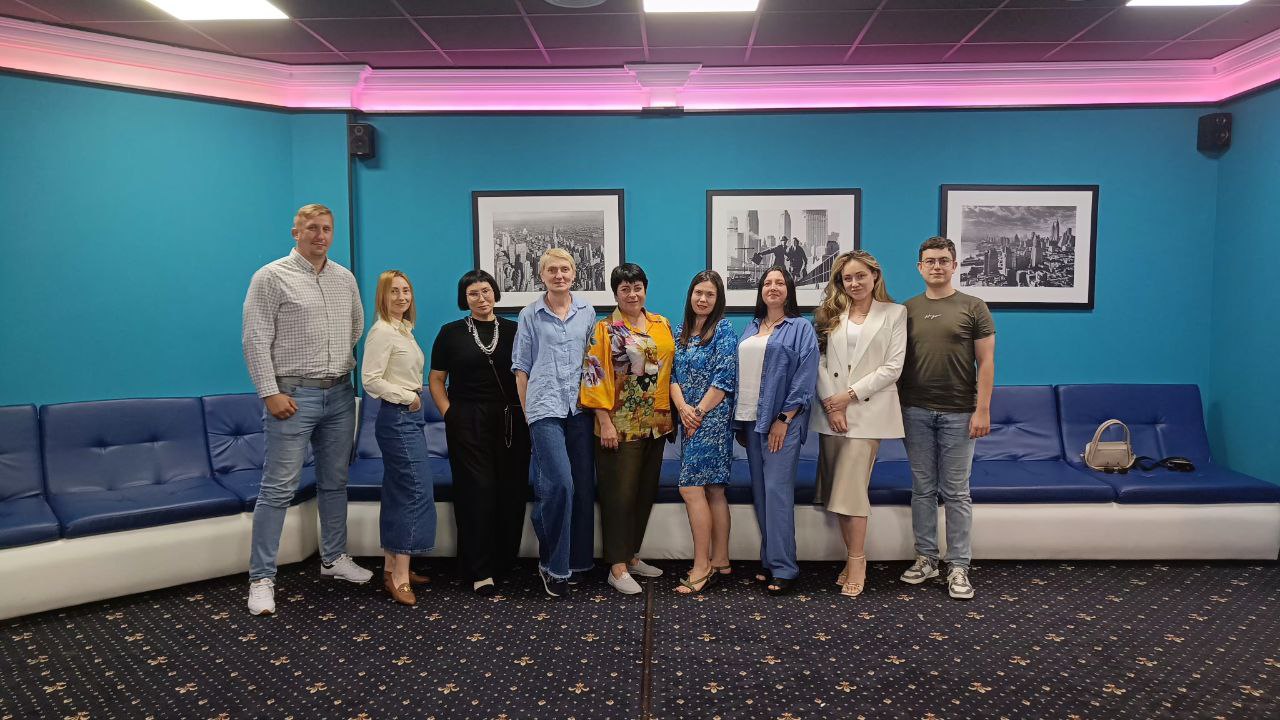
Our country held the Ukrainian stage of the European Enterprise Promotion Awards (EEPA) and recognised domestic business leaders.
“The European Union continues to support Ukrainian SMEs through many EU4Business programmes, which, among other things, help to establish new connections and integrate Ukrainian partners into European practices. The European Enterprise Promotion Awards, which Ukraine is once again joining, is a powerful platform for supporting entrepreneurship, recognising the best initiatives, business networking and leadership. This year, thanks to a large-scale national campaign, even more, Ukrainian participants became aware of the award and joined the competition, as a result of which the best projects will be presented at the European level and will once again demonstrate the talent and resilience of Ukrainians despite the challenges of war,” said Iryna Hubarets, Sector Manager – Competition and Economic Cooperation, Delegation of the European Union to Ukraine.
119 applicants submitted applications for participation in the competition. In the final selection round, project representatives presented their activities live to the jury.
Among the finalists, one winner was selected in each of the six categories:
The two category winners will go to the European EERA awards ceremony at the #SMEassembly2024, which will take place in Hungary in November 2024. The jury decided that this year Ukraine will be represented by the “Climate Innovation Vouchers” project and the “New Economy of Ivano-Frankivsk (NEF) — supporting emerging innovative economic activity clusters”.
A separate Grand Prix award for the most creative and inspiring business initiative in Ukraine went to the International Entrepreneurship Development project.
The jury of the competition:
The national coordinator of the competition is the Ministry of Economy of Ukraine.
The Ukrainian Enterprise Promotion Awards 2024 was initiated by the Ministry of Economy of Ukraine, the Ministry of Digital Transformation of Ukraine and the Entrepreneurship and Export Promotion Office within the framework of the EU4Business project: SME Policies and Institutions Support (SMEPIS) project, implemented by Ecorys in consortium with GIZ, BRDO and Civitta and funded by the European Union in Ukraine.